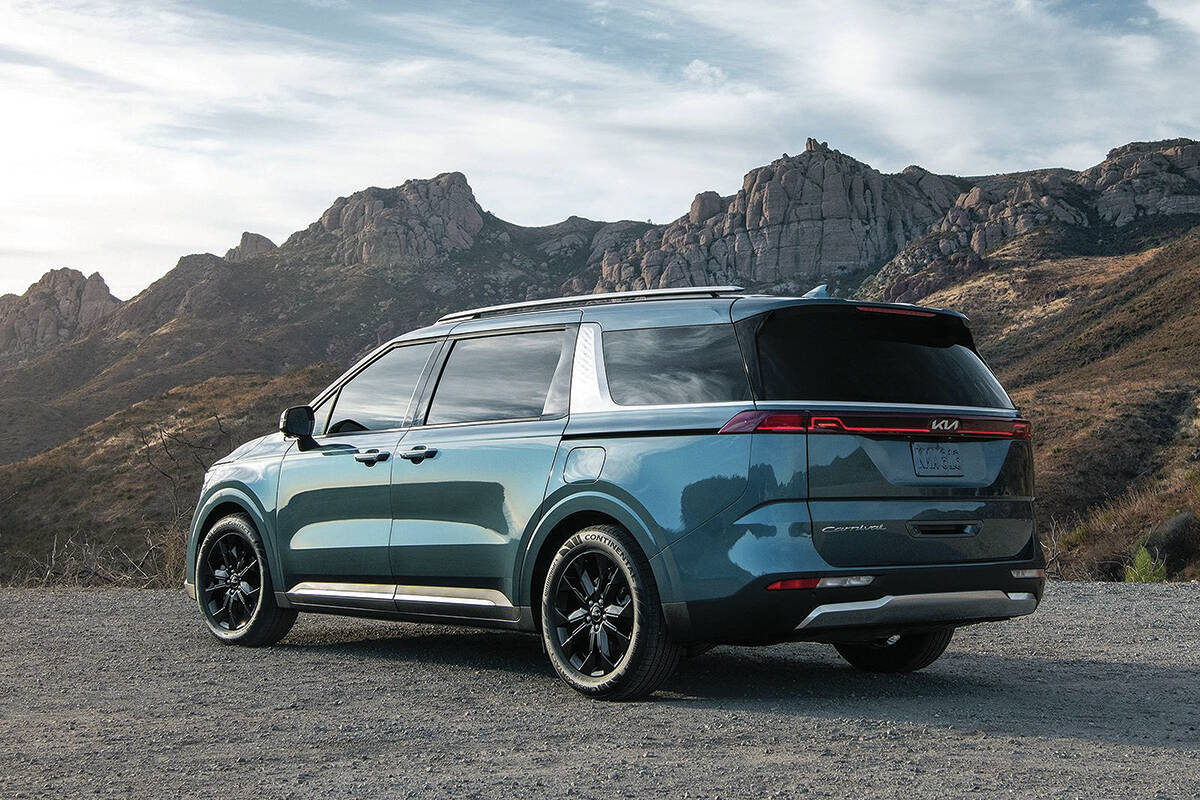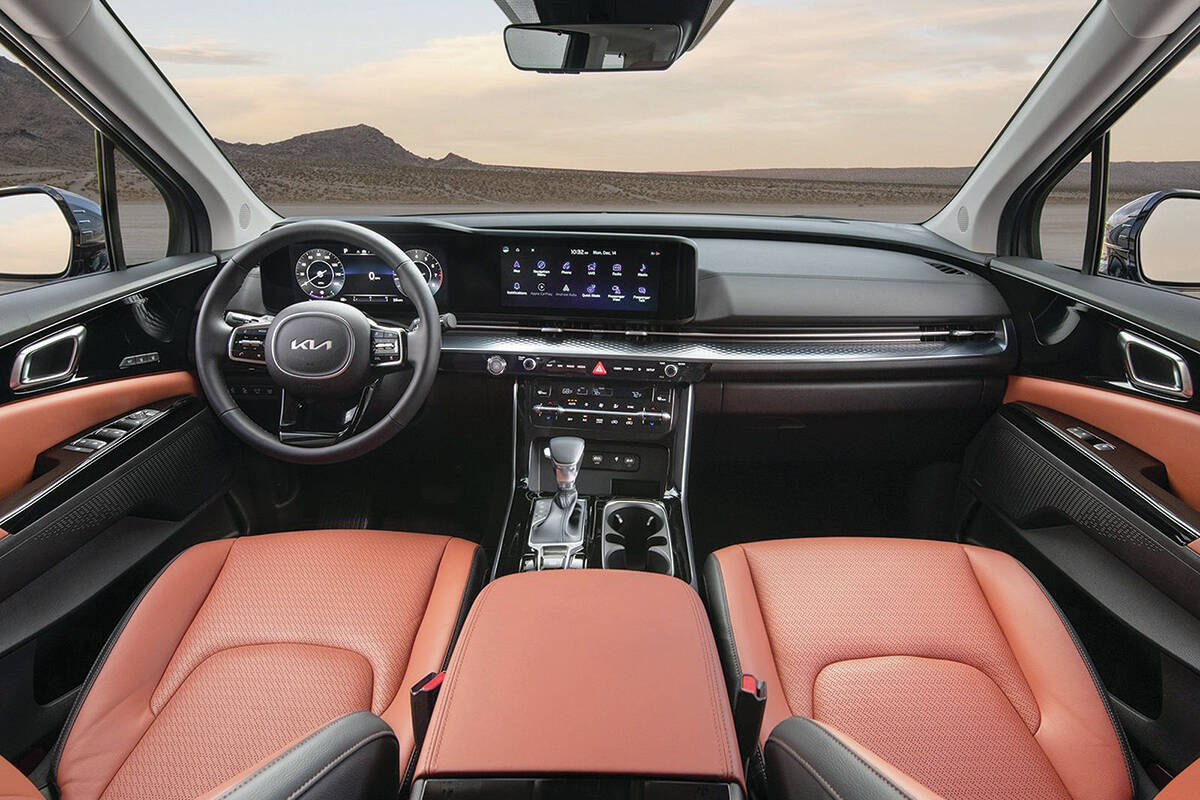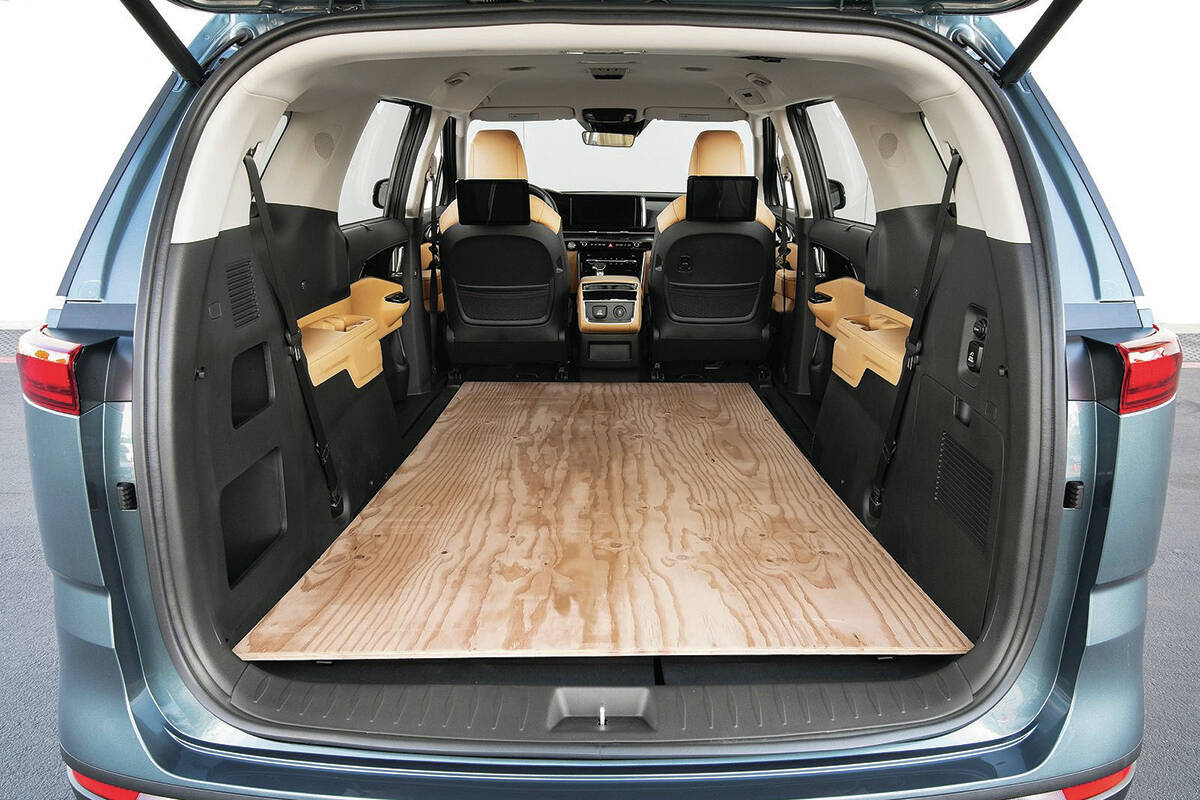The Carnival represents the latest hybrid model from Kia. No, we’re not talking about the power system, which is gasoline only, but this division of Hyundai Group has successfully merged minivan and utility vehicle designs to create a unique transportation class.
The name Carnival might seem a rather odd one for an automobile (Carnival ride, anyone?), but considering its many unique touches, that somewhat questionable branding decision can be overlooked.
It has dual sliding rear doors, seating for up to eight passengers and it replaces the Sedona minivan. That clearly suggests there’s significant minivan DNA in the Carnival.
But the squared-off part-utility-vehicle body, flat roofline and prominent wheel arches send mixed messages to the brain as to what’s really going on. No wonder Kia’s product communications people are referring to the Carnival as an MPV — multi-purpose vehicle — instead of a minivan.
The Carnival is perched on a lighter and stronger platform that also supports the Sorento utility vehicle and K5 sedan. Overall dimensions are quite similar to the Sedona’s, with slight variances in length, width and distance between the front and rear wheels. Both models have the same 1,365-kilogram (3,500-pound) tow rating. It’s only when comparing cargo space behind the third row of seats that the Carnival bests the Sedona by a wide margin.
There’s really no comparison from an interior design standpoint. The Carnival’s modern controls include an eight- or optional 12.3-inch touch-screen plus digital gauges that are propped up ahead of the dashboard. Separate controls below the screen operate the climate and audio functions.
Second- and third-row seating varies according to trim level. Eight-passenger versions come with a sliding second-row mid-section that converts to a handy table.
The top-level SX trim has second-row power-reclining bucket “lounge” seats — heated and ventilated, of course — with footrests that make them ideal for private-jet-style snoozing on long journeys.
When additional cargo room is required, each section of the three-person third-row split bench can be folded into the floor. The second-row seats can be removed, which is less convenient than the Chrysler Pacifica minivan’s Stow ’N Go system that stores them beneath the floor.
The only engine available is a 3.5-litre V-6 that puts out 290 horsepower and 262 pound-feet of torque. The Sedona’s 3.3-litre V-6 made 276 horses and 248 pound-feet.
Fuel consumption is rated at 12.0 l/100 km in the city, 8.9 on the highway and 10.6 combined, and power is directed to the front wheels via an eight-speed automatic transmission.
The fact that the Carnival is not available with all-wheel-drive will disappoint some buyers who would expect to find that option in a so-called multi-purpose vehicle. Even the Pacifica and Sienna minivans along with virtually every utility vehicle and most crossovers make AWD available.
The base LX starts at $36,750 in Canada, including destination charges. It comes with a reasonable degree of content, including front and rear air conditioning, power-sliding rear doors, six charging outlets and 17-inch alloy wheels. It has a number of active-safety technologies such as forward-collision avoidance, pedestrian detection and lane-departure warning/assist.
The EX gets the bigger touch-screen, tri-zone climate control, navigation, wireless phone charger and a power tailgate. The SX gets fancier exterior trim with roof rails, fog lights, rear-seat entertainment system and 19-inch wheels.
Along with the reclining second row chairs, the SX has premium leather seat covers, dual power sunroofs, 12-speaker Bose-brand audio system and a rear blind-spot video monitor that displays a side view when the turn signals are activated.
Ultimately, it really doesn’t matter what you call the Carnival or how you categorize it. Simply put, it’s a promising people mover with more than ample space for groceries, goods and gear.
What you should know: 2022 Kia Carnival
Type: Front-wheel-drive midsize minivan
Engine (h.p.): 3.5-litre V-6 (290)
Transmission: Eight-speed automatic
Market position: Kia doesn’t call the Carnival a minivan, but if you had to put a label on it, minivan is perfectly reasonable since the vehicle is the designated replacement for the Kia Sedona, and it has sliding rear doors.
Points: Overall design is similar to that of most utility vehicles that have three rows of seats. • Modern interior has digital gauges, which are become commonplace. • Standard array of active-safety tech covers most contingencies. • Surprising that all-wheel-drive is absent from the options list. Well-priced in a competitive field. • Extra-roomy cabin is a big plus.
Active safety: Blind-spot warning with cross-traffic backup alert (std.); active cruise control (std.); front and rear emergency braking (std.); inattentive-driver alert (std.); lane-departure warning (std.); pedestrian detection (n.a.)
L/100 km (city/hwy): 12.0/8.9
Base price (incl. destination): $36,750
BY COMPARISON
Chrysler Pacifica
- Base price: $41,700
- Updated-for-2021 minivan comes with a 287-h.p. V-6 AWD is available.
Honda Odyssey
- Base price: $45,400
- A mild refresh and revised comfort and safety content were added for 2021.
Toyota Sienna
- Base price: $41,800
- New platform and a standard four-cylinder hybrid system. AWD is available.
– written by Malcom Gunn, Managing Partner at Wheelbase Media
If you’re interested in new or used vehicles, be sure to visit TodaysDrive.com to find your dream car today! Like us on Facebook and follow us on Instagram




